Sherwood Anderson
unit 6 Sherwood Anderson and the egg
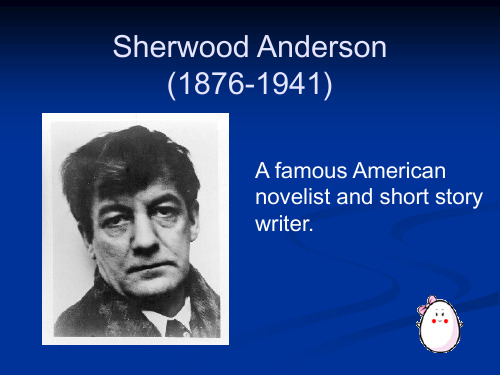
works
Novels Short
story collections Poetry Drama Nonfiction
Novels
Windy
Mcpherson's son (1916) Marching Men (1917) Poor white (1920) Many Marriages (1923) Dark Laughter (1925)
Lihis leave, he once said, "I was a business man and got sick of it, and went into writing, not to make a success, but to give myself an interest in life" Anderson moved back to Chicago, working again for a publishing and advertising company. In 1916, he divorced Lane and married Tennessee Mitchell. In his whole life, he divorced and remarried for four times
He finally left high school before graduating.
Nickname: Jobby
Life experience
He worked as a manual laborer until enrolling in the army for service in Cuba during the Spanish-American War. After the war, he returned to Ohio, studied in Wittenberg Academy(威特宝学院) in Springfield(斯普林菲尔德) and completed his high school education. This led to a new job in Chicago as an copywriter and solicitor.
Sherwood Anderson中英对照生平介绍
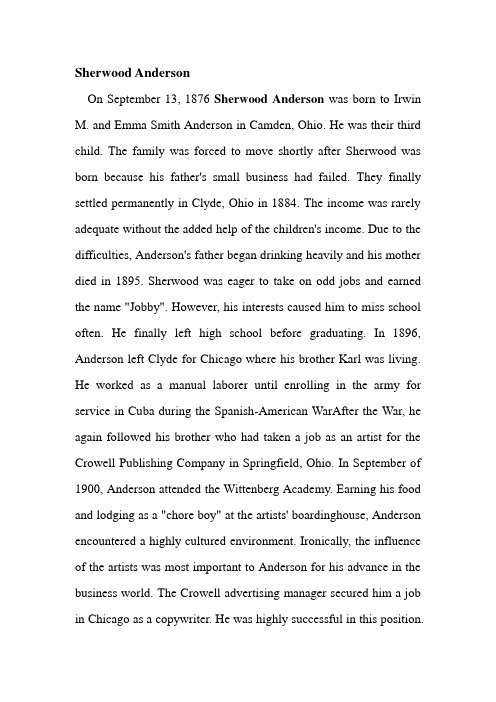
Sherwood AndersonOn September 13, 1876 Sherwood Anderson was born to Irwin M. and Emma Smith Anderson in Camden, Ohio. He was their third child. The family was forced to move shortly after Sherwood was born because his father's small business had failed. They finally settled permanently in Clyde, Ohio in 1884. The income was rarely adequate without the added help of the children's income. Due to the difficulties, Anderson's father began drinking heavily and his mother died in 1895. Sherwood was eager to take on odd jobs and earned the name "Jobby". However, his interests caused him to miss school often. He finally left high school before graduating. In 1896, Anderson left Clyde for Chicago where his brother Karl was living. He worked as a manual laborer until enrolling in the army for service in Cuba during the Spanish-American WarAfter the War, he again followed his brother who had taken a job as an artist for the Crowell Publishing Company in Springfield, Ohio. In September of 1900, Anderson attended the Wittenberg Academy. Earning his food and lodging as a "chore boy" at the artists' boardinghouse, Anderson encountered a highly cultured environment. Ironically, the influence of the artists was most important to Anderson for his advance in the business world. The Crowell advertising manager secured him a job in Chicago as a copywriter. He was highly successful in this position.In 1904, he married Cornelia Lane, the daughter of a wealthy Ohio wholesaler. Although he hoped to become an artist, he lived as a bourgeois husband and father of three for a couple of years. He left Chicago for Northern Ohio in 1906 and over the next six years, he managed a mail-order business in Cleveland and then two paint manufacturing firms. Yet, Anderson increasingly spent his free time writing. On November 27, 1912 he disappeared from his office and was found four days later in Cleveland, disheveled and disoriented, having suffered a mental breakdown. In later writings, Anderson often referred to this episode as a conscious break from his materialistic existence and many younger writers picked up on this, praising his heroic spirit.However much of the story was reconstructed, Anderson did respond to the pivotal moment and broke from his job in Elyria. Instead of becoming a Bohemian artist though, he rejoined the advertising agency in Chicago. He sent for his family, wrote the circulars as he once had, and continued to write feverishly in his free time. In 1914, he divorced Cornelia and married Tennessee Mitchell. That same year his first novel was published, entitled Windy McPherson's Son. Along with his second, Marching Men, of 1917, he later commented that his first novels were raw and immature. He is best known for his classic collection of tales, Winesburg, Ohio, which he had begunwriting in 1915 and generally wrote in the order the stories appear in the text. The book was published in 1919 and received much acclaim, establishing him as a talented modern American author. He espoused themes similar to the later works of T.S. Eliot and other modernists.舍伍德•安德森(Sherwood Anderson又译作薛伍德•安德森)于1876年9月13日出生于俄亥俄州的坎登(Camden) ,他以自己家乡为题材所写的短篇小说,是他最广为人知的作品。
Sherwood Anderson I am a fool分析
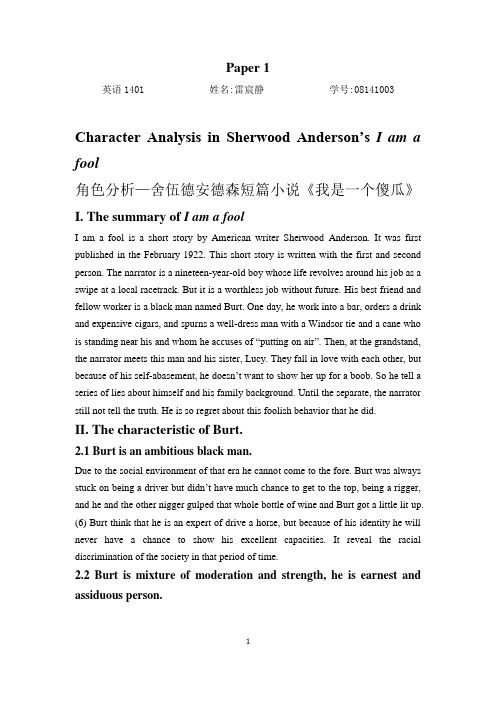
Paper 1英语1401 姓名:雷宸静学号:08141003Character Analysis in Sherwood Anderson’s I am a fool角色分析—舍伍德安德森短篇小说《我是一个傻瓜》I. The summary of I am a foolI am a fool is a short story by American writer Sherwood Anderson. It was firstpublished in the February 1922. This short story is writtenwith the first and second person. The narrator is a nineteen-year-old boy whose life revolves around his job as a swipe at a local racetrack. But it is a worthless job without future. His best friend and fellow worker is a black man named Burt. One day, he work into a bar, orders a drink and expensive cigars, and spurns a well-dress man with a Windsor tie and a cane who is standing near his and whom he accuses of “putting on air”. Then, at the grandstand, the narrator meets this man and his sister, Lucy. They fall in love with each other, but because of his self-abasement, he doesn’t want to show her up for a boob. So he tell a series of lies about himself and his family background. Until the separate, the narrator still not tell the truth. He is so regret about this foolish behavior that he did.II. The characteristic of Burt.2.1Burt is an ambitious black man.Due to the social environment of that era he cannot come to the fore. Burt was always stuck on being a driver but didn’t have much chance to get to the top, being a rigger, and he and the other nigger gulped that whole bottle of wine and Burt got a little lit up.(6) Burt think that he is an expert of drive a horse, but because of his identity he will never have a chance to show his excellent capacities. It reveal the racial discrimination of the society in that period of time.2.2Burt is mixture of moderationand strength, he is earnest and assiduous person.The narrator “liked Burt fine”, and they “got along splendid together” (1). The swipe says that Burt has “soft, kind eyes”, and yet “when it came to a fight he could hit like Jack Johnson” (1). Burt did no t show off. Though he possessed such great strength and skill, he was generally kind and gentle, and did not reveal his other side unless needed. Burt was modest and made the swipe feel at ease.III The characteristic of the narrator.3.1T he narrator is immature and uneducated.3.1.1 The narrator is emotional and irrationalSome people never do any wrong for him, yet he jealously hates them. He wants to hurt the boy on purpose who was “saving money to work his way through college” because that boy was taking jobs away from him (1). When he meets the man with the Windsor tie, he is repelled by his distinguished outfits and he showed off by buying cigars and wines. “There aren’t Walter Mathers, like I said to her and them, and there hasn’t been one, but if there was, I bet I’d go to Marietta, Ohio, and shoot him tomorrow.” (9) He wishes to “shoot” him. He resents those who have what he doesn’t have. So from these examples it can illustrate that he is not mature enough to treat this social distinction with a placid.3.1.2 The narrator is uneducated.At the very beginning of this story “It was a hard jolt for me, one of the most bitterest I ever had to face.” When he uses phr ases such as “most bitterest”, his improper grammar and many slang uses, such as “yaps” illustrate that he is an uneducated man.“I kept thinking of wagons running over him and bricks falling on his head as he walked along the street.” (1) The narrator resents the boy who gets the job from him by use the pretest that he want to save money to go to university. The narrator wants nothing to do with education. He believes that the “fellows” who “go to high schools and colle ge…don’t know nothing at all” (2). The narrator got his education at the stables, the races, and the saloons; he does not care to be properly educated. He doesn’t have an awareness about the important of education.3.2The narrator has inferior complex.“In the bar there was a fellow with a cane and a Windsor tie on, that it made me sick to look at him.”(4) It also shows the narrator’s inferior complex. He didn’t born in a rich family, doesn’t have a superior social standard.The narrator is from a poor white people family and took a job as a swipe, it’s the only job he could get. “They boththought it something disgraceful that one of our family should take a place as a swipe with race horse.” His mother and sister thought th at this job was “disgraceful” (1). At first, he doesn’t think so, but w hen he meets Miss Wessen he is fall in love with her and he doesn’t want her know his real identity, but want to make a good impression. “One thing’s about as good as another, if you take it just right. I’ve often said that.”(4) It shows one of the moral standards of the narrator, but when he sees Miss Wessen’s “nice clothes” and “nice eyes”, he wants to impress her with a different identity. He does not want to “show her up for a boob” (7), so he tell a series of lies. The narrator tells lie because of the sense of self-abasement. When the narrator sees other person have something that he doesn’t have, the sense of inferiority will well up in his heart, and he can’t help to perfect himself by brags.The friendship between the narrator and Burt is an example of his naïve about his social status. Burt is a n black man, he is a person who is live in the bottom rung of the society. The narrator, as the friend of Burt, they do the same job, and have the same social status. He pretends as a rich man who is totally different from him. He is oblivious of his low social rank. He said that he is a fool because he lies to others, but I think is not because of that, but because he deceives himself about his family background, his life, his experience, his true feelings and his heart. And what he do give rise to an irrevocable consequence.。
Sherwood Anderson
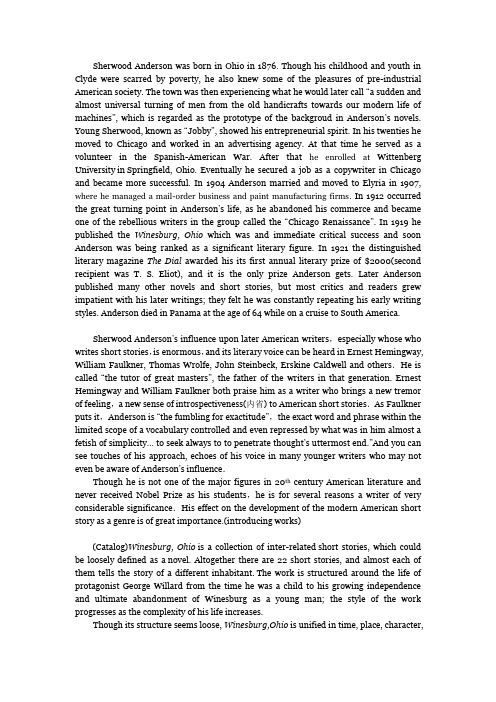
Sherwood Anderson was born in Ohio in 1876. Though his childhood and youth in Clyde were scarred by poverty, he also knew some of the pleasures of pre-industrial American society. The town was then experiencing what he would later call “a sudden and almost universal turning of men from the old handicrafts towards our modern life of machines”, which is regarded as the prototype of the backgroud in Anderson’s novels. Young Sherwood, known as “Jobby”, showed his entrepreneurial spirit. In his twenties he moved to Chicago and worked in an advertising agency. At that time he served as a volunteer in the Spanish-American War. After that he enrolled at Wittenberg University in Springfield, Ohio. Eventually he secured a job as a copywriter in Chicago and became more successful. In 1904 Anderson married and moved to Elyria in 1907, where he managed a mail-order business and paint manufacturing firms. In 1912 occurred the great turning point in Anderson’s life, as he abandoned his commerce and became one of the rebellious writers in the group called the “Chicago Renaissance”. In 1919 he published the Winesburg, Ohio which was and immediate critical success and soon Anderson was being ranked as a significant literary figure. In 1921 the distinguished literary magazine The Dial awarded his its first annual literary prize of $2000(second recipient was T. S. Eliot), and it is the only prize Anderson gets. Later Anderson published many other novels and short stories, but most critics and readers grew impatient with his later writings; they felt he was constantly repeating his early writing styles. Anderson died in Panama at the age of 64 while on a cruise to South America.Sherwood Anderson’s influence upon later American writers,especially whose who writes short stories,is enormous,and its literary voice can be heard in Ernest Hemingway, William Faulkner, Thomas Wrolfe, John Steinbeck, Erskine Caldwell and others.He is called “the tutor of great masters”, the father of the writers in that generation. Ernest Hemingway and William Faulkner both praise him as a writer who brings a new tremor of feeling,a new sense of introspectiveness(内省) to American short stories.As Faulkner puts it,Anderson is “the fumbling for exactitude”,the exact word and phrase within the limited scope of a vocabulary controlled and even repressed by what was in him almost a fetish of simplicity… to seek always to to penetrate thought’s uttermost end.”And you can see touches of his approach, echoes of his voice in many younger writers who may not even be aware of Anderson’s influence.Though he is not one of the major figures in 20th century American literature and never received Nobel Prize as his students,he is for several reasons a writer of very considerable significance.His effect on the development of the modern American short story as a genre is of great importance.(introducing works)(Catalog)Winesburg, Ohio is a collection of inter-related short stories, which could be loosely defined as a novel. Altogether there are 22 short stories, and almost each of them tells the story of a different inhabitant. The work is structured around the life of protagonist George Willard from the time he was a child to his growing independence and ultimate abandonment of Winesburg as a young man; the style of the work progresses as the complexity of his life increases.Though its structure seems loose, Winesburg,Ohio is unified in time, place, character,theme, style, and form.It’s about the people who give life and identity to the town.Each of them becomes the focal point and the substance of a story, as the nature of each is laid bare in a moment of Anderson’s insight into what makes his people grotesque. “The book is about extreme states of being, the collapse of men and women who have lost their psychic bearings and now hover, at best tolerated, at the edge of the little community in which they live.”Winesburg,Ohio is the milestone of Anderson which provides him the solid foundation of his literary reputation in times of disfavor as well as favor. It is not a book of rebellion as were his earlier works of fiction;instead, it is an affirmation of Anderson’s belief in human spirit and of the compassion that he felt was needed at the heart of human relations.Wing Biddlebaum talked much with his hands. The slender expressive fingers, forever active, forever strivng to conceal themselves in his pockets or behind his back, came forth and became the piston rods of his machinery of expression.The story of Wing Biddlebaum is a story of hands. Their restless activity, like unto the beating of the wings of an imprisoned bird, had given his his name.(p.8) (Hands)In the office he wore also a linen duster with huge pockets into which he continually stuffed scraps of paper. After some weeks the scraps of paper became little hard round balls, and when the pockets were filled he dumped theme out upon the floor.(p.15) On the papers were written thoughts, ends of thoughts, beginnings of thoughts.One by one the mind of Doctor Reffy had made the thoughts. Out of many of them he formed a truth that arose gigantic in his mind. The truth clouded the world. It became terrible and then faded away and the little thoughts began again.(p.15-16) (Paper Pills)The communion between George Willard and his mother was outwardly a formal thing without meaning.(p.19)“I think you had better be out among the boys. You are too much indoors,” she said, striving to relieve the embarrassment of the departure. “I thought I would take a walk,”replied George Willard, who felt awkward and confused.(p.21) (Mother)Alice went upstairs to her room and undressed in the darkness. For a moment she stood by the window hearing the rain beat against the glass and then a strange desire took possession of her. Without stopping to think of what she intended to do, she ran downstairs through the dark house and out into the rain.She wanted to leap and run, to cry out, to find some other lonely human and embrace him.“What is the matter with me? I will do something dreadful if I am not careful,” she thought, and turning her face to the wall, began trying to force herself to face bravely the fact that many people must live and die alone, even in Winesburg.(p.84-85) (Adventure)He wanted most of all the people of his own mind, people with whom he could reallytalk, people he could harangue and scold by the hour, servants, you see, to his fancy. Among these people he was always self-confident and bold. …He was like a writer busy among the figures of his brain.(p.127) (Loneliness)All of his thought the children were involved with the thoughts of Hal and he thought the children were clutching at the younger man also. “They are the accidents of life, Hal,”he cried. “They are not mine or yours. I had nothing to do with them.”(p.159) “It’s just as well. Whatever I told him would have been a lie,” he said softly, and then his form also dissappeared into the darkness of the fields.(p.160) (The Untold Lie)Some perspectives for analysis and reflection1 distortion of humanity caused by industrialisation; “spiritual wasteland”2 lonliness and alienation; failure of communication3 George Willard’s growth4 application of symbolism5 application of epiphany(顿悟)6 writing style: short sentences, a sparse vocabulary and uncomplicated syntax; simple but artful1 distortion of humanity caused by industrialisation; “spiritual wasteland”《小镇畸人》以一种开创性的松散结构始终如一地表达了工业文明对人性的扭曲以及爱的失落这一主题,“是第一次世界大战以后第一部在美国文学中表现‘荒原’这一主题的作品。
Sherwood Anderson+the other woman

Life experience
Born into a poor family in southern Ohio, the third of seven children in a family. The family was forced to move shortly after Sherwood was born because his father's small business had failed. They finally settled permanently in Clyde, Ohio in 1884. Due to the financial difficulties, Anderson's father began drinking heavily. When he was 12 years old, he began to take on odd jobs. He finally left high school before graduating. He worked as a manual laborer until enrolling in the army for service in Cuba during the Spanish-American War.
Anderson's third marriage also failed, and he married Eleanor Copenhaver in the late 1920s. They traveled and often studied together. In the 1930s, Anderson published Death in the Woods, Puzzled America (a book of essays), and Kit Brandon, which was published in 1936. Anderson dedicated his 1932 novel, Beyond Desire, to Copenhaver. Although he was much less influential in this final writing period, many of his more significant lines of prose were present in these works, which were generally considered subpar compared to his other works.
外研社美国文学史及选读(第三版)(第一册)教学课件Chapter 26 Sherwood Ander
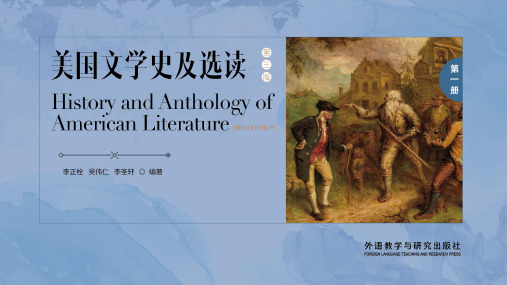
Content
Chapter 21 Henry James Chapter 22 Kate Chopin Chapter 23 O. Henry Chapter 24 Theodore Dreiser Chapter 25 Jack London Chapter 26 Sherwood Anderson
Wing Biddlebaum, forever frightened and beset by a ghostly band of doubts, did not think of himself as in any way a part of the life of the town where he had lived for twenty years. Among all the people of Winesburg but one had come close to him. With George Willard, son of Tom Willard, the proprietor of the new Willard House, he had formed something like a friendship. George Willard was the reporter on the Winesburg Eagle and sometimes in the evenings he
sherwood anderson

舍伍德·安德森(Sherwood Anderson又译作薛伍德·安德森)于1876年9月13日出生于俄亥俄州的坎登(Camden) ,他以自己家乡为题材所写的短篇小说,是他最广为人知的作品。
他在书中描述「令人沉思不已的中西部故事」,这些故事显示「作者对于平凡人物深刻的描写与怜悯。
」作为一个马具制造者与临时油漆工的第三个小孩,安德生有说故事的天分。
安德生年轻的时候时常想要做一个经济独立的人。
他结婚之后共生了三个小孩,虽然他努力工作,但是却对现实商场的工作感到不满。
一直到1909年时,他因为过度辛劳而生成暂时性的精神崩溃。
就在那一年,他开始一边担任芝加哥一家广告公司的记帐员,一边撰写科幻小说。
在芝加哥时,他遇见很多位作家,例如卡尔.山得堡(Cark Sandburg) ,以及创立芝加哥文学复兴运动的西奥多.得瑞司尔(Theodore Dreiser) 。
这些作家中,有很多人和安德生一样,都是在中西部的小城镇中长大的。
在两次世界大战之间,薛伍德.安德生对于美国文坛有相当大的影响。
他擅长把每天谈话中的真实话语用文字表达出来,并且用全新的格式与风格撰写文章,打破了过去常规、守旧的形式。
他对于美国新一代的作家也有很深远的影响,其中最有名的就是恩斯特.海名威(Ernst Heimingway) 以及威廉.福克纳(William Faulkner) 。
许多老牌的作家常常会施压年轻作家,要求他们应该要写自己最擅长的东西。
但是当安德生于1924年在纽奥良遇到福克纳时,他鼓励福克纳撰写有关密西西比家乡的故事。
安德生的作品中,以1919年集结短篇小说出版的俄亥俄州的威尼斯堡(Winesburg, Ohio) 被普遍认为是最好的作品。
Have you ever written a story about your hometown? Maybe you think it's too "boring" to write about. If so, take a look at American writer Sherwood Anderson. Born on September 13, 1876, in Camden, Ohio, he is best known for his short stories that reflect his small-town, Midwestern past. Described as "brooding Midwest tales," they reveal "their author's sympathetic insight into the thwarted lives of ordinary people." This third child of a harness maker and sometime house painter had a fondness for storytelling.As a young man, Anderson was intent on establishing his financial independence. He married, had three children and worked, with growing dissatisfaction, in the corporate world until 1909, when he suffered a brief nervous breakdown. He began to write fiction that year while working as a copywriter at a Chicago advertising agency. In Chicago, he met other thriving writers such as Carl Sandburg and Theodore Dreiser, who formed a sort of Chicago literary renaissance. Many of them, like Anderson, had grown up in small Midwestern townsSherwood Anderson had an important influence upon American writing between World War I and World War II. He is credited with capturing the real sound of everyday speech in his writing and experimenting with new forms and styles, breaking down tired, old formulas. He influenced a whole generation of writers, most notably Ernest Hemingway and William Faulkner. Many experienced writers have stressed that a young writer should write about what he or she knows best. While in New Orleans in 1924, Anderson encouraged Faulkner to write about his home county in Mississippi. Anderson's 1919 collection of short stories, Winesburg, Ohio, is widely considered his best work.舍伍德·安德森(Sherwood Anderson,1876-1941),1876年9月13日出生在中西部俄亥俄州克莱德镇的一个贫寒家庭。
舍伍德安德森

“ 现 代 美 国 文 学 的 语 言 在 很 大 程 度 上 应 该 归 功 于 舍 伍 德 ·安 德 森 的 创 新 , 没 有 他 我 们 也 许 现 在 还 在 亦 步 亦 趋 地模仿欧洲文人别扭的贵族语言风格。”(美国作家海明威《非洲的青山》评)
人物评价
“与同时代作家相比,安德森是唯一一位在后代作家作品留下其印记的小说家。这些作家的作品中都带有他 的 风 格 与 见 解 。 事 实 上 , 在 后 来 的 作 家 如 海 明 威 、 福 克 纳 、 沃 尔 夫 、 斯 坦 贝 克 、 卡 德 威 尔 、 萨 洛 扬 、 亨 利 ·米 勒……的身上,都不同程度地能看到安德森的影子。而他们仅仅是其中的一些作家。”(安德森研究专家马尔科 姆·考利评)
签名 1916年,他以俄亥俄故乡为背景,写了一系列故事,在杂志上陆续刊载,后汇集出版,取名《小城畸 人》(1919),获得文艺界的好评,奠定了小说家声誉。
1921年,他又出版短篇小说集《鸡蛋的胜利》,再一次轰动文坛。随后,新作接连问世,如短篇小说集 《马与人》(1923)、自传体小说《讲故事的人的故事》(1924)和《沥青:中西部的童年》(1926)以及短 篇故事集《林中之死》(1933)。他也写长篇小说,但比较不成功。受欢迎的有:《穷白人》(1920)和《黑 色的笑声》(1925)。晚年,安德森陷入感情危机,创作精力枯竭,没有力作问世。
情节设计
安德森小说并不追求复杂的情节,但是安德森在小说的情节构造方面有着开拓性的方式,形成了......
人物影响
安德森在美国文学史上占有重要地位,因为他是第一个试图创立不同于欧洲文学传统的美国短篇小说形式的 美国作家,他使文学地位不如长篇小说的短篇小说这一文学形式广受关注,且对美国的中长篇小说产生了深远影 响;他是最早关注美国人内心世界,尤其是普通美国人的内心世界,并重视揭示美国人内心世界的美国作家。
The Egg全文翻译-Sherwood Anderson
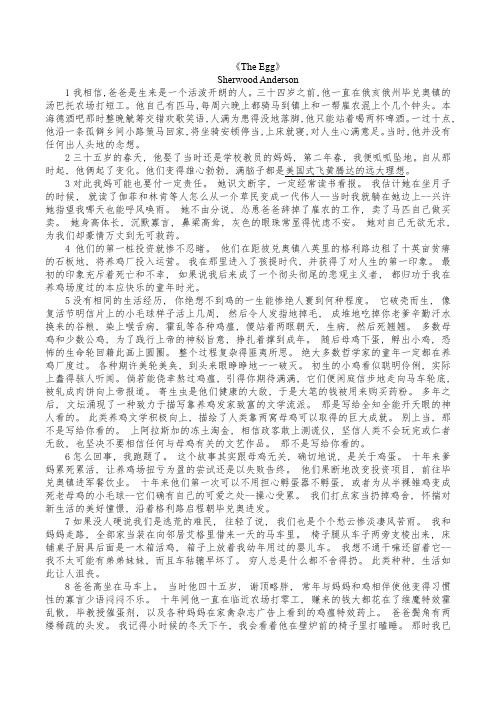
《The Egg》Sherwood Anderson1我相信,爸爸是生来是一个活泼开朗的人。
三十四岁之前,他一直在俄亥俄州毕兑奥镇的汤巴托农场打短工。
他自己有匹马,每周六晚上都骑马到镇上和一帮雇农混上个几个钟头。
本海德酒吧那时整晚觥筹交错欢歌笑语,人满为患得没地落脚,他只能站着喝两杯啤酒。
一过十点,他沿一条孤僻乡间小路策马回家,将坐骑安顿停当,上床就寝,对人生心满意足。
当时,他并没有任何出人头地的念想。
2三十五岁的春天, 他娶了当时还是学校教员的妈妈, 第二年春, 我便呱呱坠地。
自从那时起, 他俩起了变化。
他们变得雄心勃勃, 满脑子都是美国式飞黄腾达的远大理想。
3对此我妈可能也要付一定责任。
她识文断字, 一定经常读书看报。
我估计她在坐月子的时候, 就读了伽菲和林肯等人怎么从一介草民变成一代伟人--当时我就躺在她边上--兴许她指望我哪天也能呼风唤雨。
她不由分说, 怂恿爸爸辞掉了雇农的工作, 卖了马匹自己做买卖。
她身高体长, 沉默寡言, 鼻梁高耸, 灰色的眼珠常显得忧虑不安。
她对自己无欲无求, 为我们却豪情万丈到无可救药。
4他们的第一桩投资就惨不忍睹。
他们在距彼兑奥镇八英里的格利路边租了十英亩贫瘠的石板地, 将养鸡厂投入运营。
我在那里进入了孩提时代, 并获得了对人生的第一印象。
最初的印象充斥着死亡和不幸, 如果说我后来成了一个彻头彻尾的悲观主义者, 都归功于我在养鸡场度过的本应快乐的童年时光。
5没有相同的生活经历, 你绝想不到鸡的一生能惨绝人寰到何种程度。
它破壳而生, 像复活节明信片上的小毛球样子活上几周, 然后令人发指地掉毛, 成堆地吃掉你老爹辛勤汗水换来的谷粮, 染上喉舌病, 霍乱等各种鸡瘟, 傻站着两眼朝天, 生病, 然后死翘翘。
多数母鸡和少数公鸡, 为了践行上帝的神秘旨意, 挣扎着撑到成年。
随后母鸡下蛋, 孵出小鸡, 恐怖的生命轮回籍此画上圆圈。
整个过程复杂得匪夷所思。
绝大多数哲学家的童年一定都在养鸡厂度过。
舍伍德·安德森人生及作品
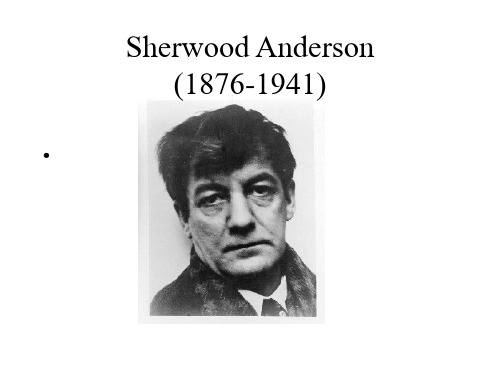
Main Characters
• Lower class figures from small town • Unsuccessful, depraved, lonely people
What caused them to become grotesques?
• America passed from a rural to a predominantly industrial society. The social transition had been a painful experience in small towns. The coming of the machine industry put lots of craftsman out of business, took away their pride and joy in achievement. The blind belief of materialism mingled with a feeling of doubt and fear among the small town residents. Industrialization dehumanized the men and women and made them grotesques and unable to communicate and love.
• Clinging to some conventional beliefs and living by their own truth, they were frustrated by their unfulfillment of their passions and dreams • They became very lonely and eventually, they are turned into grotesques by their inability to express their ideas to others and by misunderstanding between lovers, friends, mother and son and so on. • then the sense of alienation, loneliness, and want of love
舍伍德·安德森的短篇小说——《林中之死》

龙源期刊网
舍伍德·安德森的短篇小说——《林中之死》
作者:舍伍德·安德森
来源:《新高考·英语进阶(高二高三)》2015年第01期
作者简介
舍伍德·安德森(Sherwood Anderson,1876~1941),20世纪美国小说家,生于美国中西部俄亥俄州的卡姆登镇(Camden,Ohio)。
安德森14岁辍学后曾做过多种工作以维持家计,1898年他参加美国西班牙战争,退役后在芝加哥一广告公司从业。
婚后,安德森重返俄亥俄州,在经营公司之余从事文学创作。
1912年11月,安德森突然精神失常,一连四天杳无音讯,随后在克利夫兰市一家药店被人找到,恢复正常后抛弃妻子开始文学创作,直到1916年40岁时才出版第一部长篇小说。
安德森的死颇为奇特,1941年他在一次鸡尾酒告别宴会上误吞了一个牙签,引发了腹膜炎,感染而死,享年65岁,葬于弗吉尼亚,他的墓志铭为“Life,not death,is the great adventure”。
作品介绍
舍伍德·安德森的文学创作以长篇小说和短篇小说为主,长篇小说主要有《穷白人》(Poor White,1920)等,短篇小说主要收录于《俄亥俄州的温斯堡》(Winesburg,Oh/o,1919)、《林中之死》(Death in the Woods.1933)中。
和长篇小说相比,安德森的短篇小说
更为有名,他的短篇小说集《俄亥俄州的温斯堡》已经成为脍炙人口的佳作,深受读者喜爱。
安德森的作品多探讨工业化冲击下乡镇人生活的苦闷、困惑甚至心理变态,常用印象派手法描写人物内心的感受,对海明威等作家产生了影响。
mother sherwood anderson译文

mother sherwood anderson译文Mother 这个词在英语里就是“母亲、妈妈”的意思。
Sherwood Anderson 呢,这是个人名,叫舍伍德·安德森。
所以“Mother Sherwood Anderson”整体就是“舍伍德·安德森的母亲”。
咱来想象一下啊,假如舍伍德·安德森有个老妈,那会是啥样呢?也许她是个整天唠叨着让安德森多穿点别着凉的慈爱老妈;也许是个在
安德森调皮捣蛋时,拿着擀面杖追着他跑的厉害老妈。
说不定这老妈做的一手好菜,每次安德森回家,都能闻着那香喷喷
的味道,肚子立马咕咕叫。
她可能一边在厨房忙活,一边嘴里还不停
地念叨:“这小子,在外头肯定没好好吃饭!”
也有可能这位老妈是个特别心灵手巧的人,能给安德森缝补衣服,
织温暖的毛衣。
安德森穿着老妈织的毛衣,心里那叫一个暖和。
或许她总是担心安德森在外面闯祸,每次安德森出门,她都要千叮
咛万嘱咐:“别跟人打架,要听老师的话!”
要是安德森在外面受了委屈,回到家,老妈肯定一把把他搂在怀里,轻轻拍着他的背说:“没事,孩子,有妈在呢!”
总之啊,这舍伍德·安德森的母亲,不管是啥样,那对安德森来说,肯定都是心里最温暖的存在。
就算安德森长大成人,走得再远,老妈
的身影和那些关心的话语,也会一直留在他的心里头。
出处:这可能是关于舍伍德·安德森相关作品或者研究中提到的表述。
朱永涛《英语国家社会与文化入门》配套题库【课后习题】(美国文学)
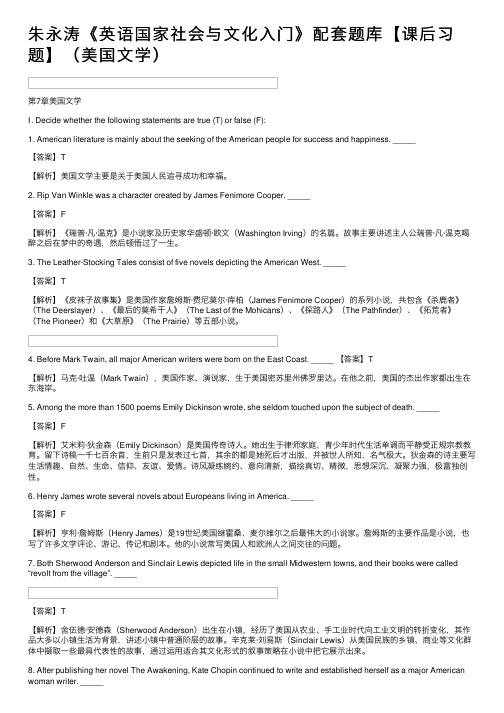
朱永涛《英语国家社会与⽂化⼊门》配套题库【课后习题】(美国⽂学)第7章美国⽂学Ⅰ. Decide whether the following statements are true (T) or false (F):1. American literature is mainly about the seeking of the American people for success and happiness. _____【答案】T【解析】美国⽂学主要是关于美国⼈民追寻成功和幸福。
2. Rip Van Winkle was a character created by James Fenimore Cooper. _____【答案】F【解析】《瑞普·凡·温克》是⼩说家及历史家华盛顿·欧⽂(Washington Irving)的名篇。
故事主要讲述主⼈公瑞普·凡·温克喝醉之后在梦中的奇遇,然后顿悟过了⼀⽣。
3. The Leather-Stocking Tales consist of five novels depicting the American West. _____【答案】T【解析】《⽪袜⼦故事集》是美国作家詹姆斯·费尼莫尔·库柏(James Fenimore Cooper)的系列⼩说,共包含《杀⿅者》(The Deerslayer)、《最后的莫希⼲⼈》(The Last of the Mohicans)、《探路⼈》(The Pathfinder)、《拓荒者》(The Pioneer)和《⼤草原》(The Prairie)等五部⼩说。
4. Before Mark Twain, all major American writers were born on the East Coast. _____ 【答案】T【解析】马克·吐温(Mark Twain),美国作家、演说家,⽣于美国密苏⾥州佛罗⾥达。
Sherwood+Anderson

Works
The Writer at His Craft, (1978, non-fiction) Paul Rosenfeld: Voyager in the Arts, (1978, nonfiction) The Teller's Tale, (1982, novel) Selected Letters: 1916 – 1933, (1984, letters) Writer's Diary: 1936 - 1941, (1987, memoir) Early Writings of Sherwood Anderson, (1989, short stories) Love Letters to Eleanor Copenhaver Anderson, (1990, letters) The Selected Short Stories of Sherwood Anderson, (1995, short stories) Southern Odyssey: Selected Writings By Sherwood Anderson, (1998, short stories)
Winesburg, Ohio
Short Summary Characters Major rg, Ohio begins with a sort of prologue, in which an old writer imagines all the people he has known as "grotesques," warped in their pursuits of various truths. A series of stories ensues, each concerned with a single resident of Winesburg. The first, entitled "Hands," describes Wing Biddlebaum, a recluse with remarkable hands that he cannot control, who has fled from false accusations of molesting a boy in another town. The second, "Paper Pills," is about Doctor Reefy, an aging medical man who marries one of his young patients, only to have her die six months later. In the third, "Mother," we meet Elizabeth Willard, the mother of the book's central character, George Willard, who is a young reporter for the local paper. Elizabeth is a sick woman, trapped in an unhappy marriage, and she imagines herself locked in a struggle with her husband for
Sherwood Anderson 生平简介

of high school at the Wittenberg Academy.
sherwood anderson舍伍德.安德森
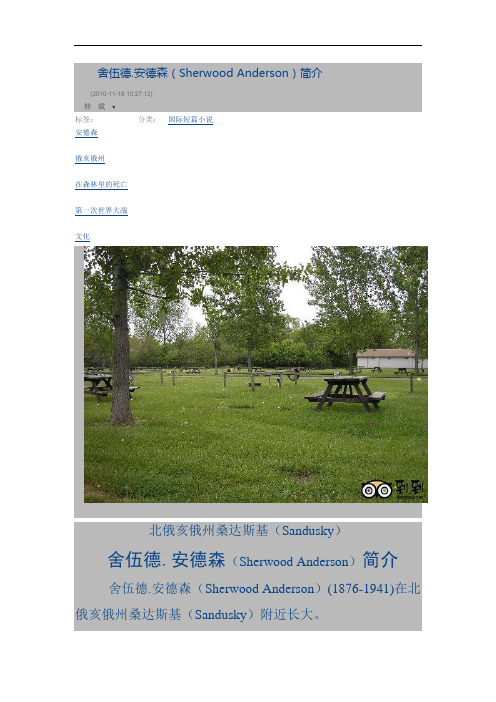
舍伍德.安德森(Sherwood Anderson)简介(2010-11-18 10:27:12)转载▼标签:分类:国际短篇小说安德森俄亥俄州在森林里的死亡第一次世界大战文化北俄亥俄州桑达斯基(Sandusky)舍伍德.安德森(Sherwood Anderson)简介舍伍德.安德森(Sherwood Anderson)(1876-1941)在北俄亥俄州桑达斯基(Sandusky)附近长大。
作家的散文风格,得自于日常用语,影响了第一次世界大战和第二次世界大战之间的美国短篇小说的写作。
安德森把他的名字作为主导的自然主义的作家,把《俄亥俄州的瓦恩斯堡》(1919)——一个典型的中西部小镇的生活画卷,如同通过当地居民的眼睛看见的一样——作为他的代表作。
安德森的教育小说情节经常与埃德加?李大师的《勺子河》文集相媲美。
“年轻人的心思被他成长的梦想激情所迷惑。
看见他的人不会认为他特别敏锐。
许多小事的回忆占据了他的头脑,他闭着眼睛斜靠在汽车座位上。
他长时间地停留在那种状态中,当他自己醒来时,再看车窗外面,瓦恩斯堡镇已经消失了,而他在那里的生活仅仅成了描绘他成年梦想的背景。
”(自《俄亥俄州的瓦恩斯堡》)舍伍德.安德森出生在俄亥俄州的卡姆登。
他的父母导致了瞬息万变的生活,总是在下班以后从一个地方搬到另一个地方。
他的父亲在联邦军队中服役,但是最终结束时只保留下一个小小的鞔具修理商店,然后为一位专画房子和谷仓的画家做工,虽然他自称是“标志作家”。
安德森只断断续续地上过学,同时通过当报童、房屋油漆、收发货经理和养马夫等工作来帮助支持家庭。
17岁时安德森搬到芝加哥。
在那里他晚上上夜校学业务,并且度过了他作为仓库工的岁月。
在美(国)西(班牙)战争期间安德森参加了在古巴的战斗并在战后回到了俄亥俄州,完成了在春田市(斯普林菲尔德)威滕伯格学院最后一年的学习。
在随后的几年里安德森在俄亥俄附近经常搬来搬去。
他的生活有一段时间安定下来并与科妮莉亚.莱恩结婚姻并作为油漆制造商而工作。
小说每个人都是一座孤岛——读《小城畸人》

⼩说每个⼈都是⼀座孤岛——读《⼩城畸⼈》⽂派第31期⽂/李雪菲1912年,美国商⼈谢伍德·安德森(Sherwood Anderson)经历了⼀次神经失常(nervous breakdown),开始从事写作。
1915-1916年间,他创作了《⼩城畸⼈》(Winesburg,Ohio)。
1919年,此书正式出版,好评如潮。
1921年,The Dial杂志授予安德森第⼀届年度⽂学奖,⽽这⼀奖项的第⼆届得主正是⼤名⿍⿍的艾略特。
这部⼀百三⼗余页的短篇⼩说系列(short story cycle)影响了海明威、福克纳等20世纪初美国作家的同体裁创作,⽽福克纳本⼈更是盛赞此书作者, ‘He was the father of my whole generation of writers’。
1998年,ModernLibrary评选的“20世纪百本最佳英语⼩说”中,此书名列24位。
当代以⾊列作家奥兹在⾃传体长篇⼩说《爱与⿊暗的故事》中提到,《⼩城畸⼈》⼀书对他的写作⽣涯产⽣了重⼤影响,使他意识到⽂学并不⼀定只关乎英雄。
这本⼩集⼦共有两个中译本,⼀本直译原⽂为《俄亥俄,温斯堡》,另⼀本则意译为《⼩城畸⼈》,在其他地⽅也有称其为《⼩城故事》的。
在我看来,“⼩城/畸⼈”,两个名词分别加上限定词,其实⾮常精妙地抓住了全书的重点。
▲Sherwood Anderson- ⼩城 -这本集⼦共由25篇短篇⼩说构成,除去第⼀篇The Book of the Grotesque作总领介绍外,剩下24篇分别讲述了⽣活在温斯堡这个⼩城中不同居民的⼈⽣或者⽣活,每篇以⼀个主⼈公为中⼼。
实际上,温斯堡是作家虚构的⼩城,但极有可能以作者⼉时⽣活的Clyde为原型。
有趣的是,1919年初版居然附有⼀副像模像样的温斯堡地图,在今天尤其能传达出看似很浓郁的历史感和怀旧⾊彩。
▲CLYDE,OHIO⼩城这⼀背景设定对全书⽽⾔⼗分关键。
在写故事的时候,地点的选择是有许多可能的,其意义与重要性也随之不同。
the egg舍伍德安德森读后感
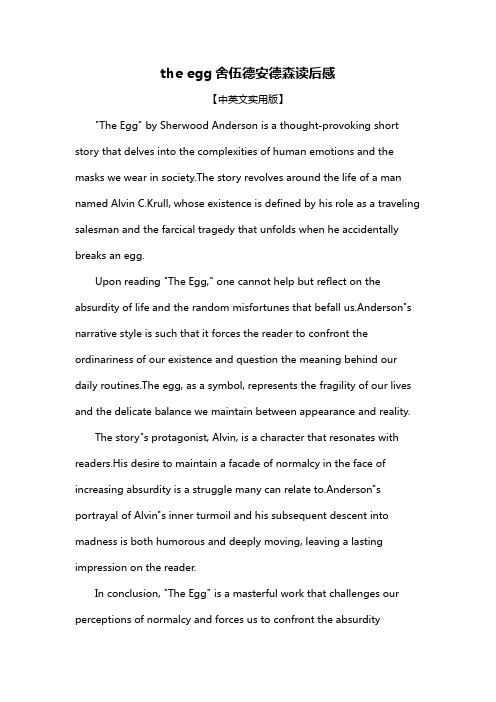
the egg舍伍德安德森读后感【中英文实用版】"The Egg" by Sherwood Anderson is a thought-provoking short story that delves into the complexities of human emotions and the masks we wear in society.The story revolves around the life of a man named Alvin C.Krull, whose existence is defined by his role as a traveling salesman and the farcical tragedy that unfolds when he accidentally breaks an egg.Upon reading "The Egg," one cannot help but reflect on the absurdity of life and the random misfortunes that befall us.Anderson"s narrative style is such that it forces the reader to confront the ordinariness of our existence and question the meaning behind our daily routines.The egg, as a symbol, represents the fragility of our lives and the delicate balance we maintain between appearance and reality.The story"s protagonist, Alvin, is a character that resonates with readers.His desire to maintain a facade of normalcy in the face of increasing absurdity is a struggle many can relate to.Anderson"s portrayal of Alvin"s inner turmoil and his subsequent descent into madness is both humorous and deeply moving, leaving a lasting impression on the reader.In conclusion, "The Egg" is a masterful work that challenges our perceptions of normalcy and forces us to confront the absurdityinherent in our lives.Sherwood Anderson"s storytelling ability is on full display, making this short story a memorable and thought-provoking read.舍伍德·安德森的《鸡蛋》是一部发人深省的短篇小说,它深入探讨了人类情感的复杂性和我们在社会中戴上的面具。
- 1、下载文档前请自行甄别文档内容的完整性,平台不提供额外的编辑、内容补充、找答案等附加服务。
- 2、"仅部分预览"的文档,不可在线预览部分如存在完整性等问题,可反馈申请退款(可完整预览的文档不适用该条件!)。
- 3、如文档侵犯您的权益,请联系客服反馈,我们会尽快为您处理(人工客服工作时间:9:00-18:30)。
• Poetry • Mid-American Chants (1918) • A New Testament (1927)
• Drama • Plays, Winesburg and Others (1937) • • • • • • • • • • • Nonfiction A Story Teller's Story (1924, memoir) The Modern Writer (1925, essays) Sherwood Anderson's Notebook (1926, memoir) Hello Towns! (1929, collected newspaper articles) Nearer the Grass Roots (1929, essays) The American County Fair (1930, essays) Perhaps Women (1931, essays) Puzzled America (1935, essays) A Writer's Conception of Realism (1939, essays) Home Town (1940, photographs and commentary)
• Clinging to some conventional beliefs and living by their own truth, they were frustrated by their unfulfillment of their passions and dreams • They became very lonely and eventually, they are turned into grotesques by their inability to express their ideas to others and by misunderstanding between lovers, friends, mother and son and so on. • then the sense of alienation, loneliness, and want of love and understanding turned people into grotesques.
Winesburg, Ohio
Anderson and Ohio
•
Winesburg, Ohio
A group of related short stories rather than a novel. Individual tales are connected in a loose but coherent structure. is a collection of isolated stories but, rather, short story cycles; that is, collections of stories with common themes, imagery, and tone, and often with common setting and characters Narrator: naï ve and young reporter for the local newspaper, George Willard. Portrays a series of grotesques .
• • • • • • •
Novels Windy McPherson's Son (1916) Marching Men (1917) Poor White (1920) Many Marriages (1923) Dark Laughter (1925) Tar: A Midwest Childhood (1926, semiautobiograpost Novel (1929) • Beyond Desire (1932) • Kit Brandon: A Portrait (1936)
• Sherwood Anderson left behind a substantial amount of work, including short fiction, novels, plays, essays, and memoirs. He is best known for his work Winesburg, Ohio (1919), a collection of stories about characters in a fictional small town.
• 36, Anderson stopped his work, left his office and never returned. • He is quoted as writing, "I was a business man and got sick of it, and went into writing, not to make a success, but to give myself an interest in life" • He divorced and remarried for four times. • On March 8, 1941, on his way to a goodwill tour of South America, Anderson died. He had swallowed a bit of a toothpick at a farewell party, which then penetrating his intestines, causing the peritonitis that killed him.
• • • • • •
Short Story Collections Winesburg, Ohio (1919) The Triumph of the Egg (1921) Horses and Men (1923) Hands and Other Stories (1925) Death in the Woods and Other Stories (1933)
• Many of the tales were based on a life Anderson had witnessed in Clyde, Ohio, the town where he spent most of his childhood and adolescent years. • The impressions he gained from the town life and character of Clyde explains why he gave the book the subtitle, "A Group of Tales of Ohio Small Town Life."
• When he returned to the states, he completed his high school education. • This led to a new job in Chicago as an copywriter and solicitor. • During this time, he wrote and published numerous essays on a variety of topics, ranging from business to literature. • In the following years, he married, had three children, and became a successful businessman.
Main Characters
• grotesque • Lower class figures from small town • Unsuccessful, depraved, lonely people
What caused them to become grotesques?
• America passed from a rural to a predominantly industrial society. The social transition had been a painful experience in small towns. • The coming of the machine industry put lots of craftsman out of business, took away their pride and joy in achievement. • The blind belief of materialism mingled with a feeling of doubt and fear among the small town residents. • Industrialization dehumanized the men and women and made them grotesques and unable to communicate and love.
• “grotesque”: • Odd or unnatural in shape, appearance or character; fantastically ugly or absurd, bizarre
• The lonely people manifest themselves under Anderson’s pen as grotesques, as their lives have been distorted by their inability to express themselves. Malcolm Cowley called them “emotional cripples” since they can not truly communicate with others.
